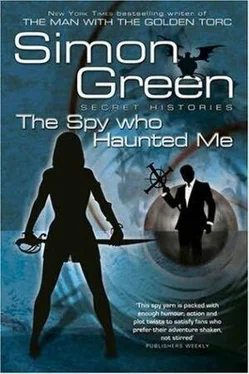Then someone came up with the idea of a great volcanic explosion from underground caused by accumulated pressure. Except that would have left a crater too. There have been more theories down the years: a crashing alien spacecraft, a miniature black hole just passing through, even an escape attempt from Hell. But my family would have known about those. A century after the Tunguska Event, the scientists are still arguing and getting nowhere.
“That’s all very well and groovy,” said Peter. “But that’s there, and we are here. What is this place? Why doesn’t it have a proper name? And, most important, why the Oh, shit ?”
“All those old science cities had bad reputations,” I said. “But X37 was in a class all its own. And, it may be coincidence or it may not . . . but we’re not that far from one of the great Drood secrets. Some miles from here, something very old and unspeakably powerful lies sleeping, buried deep under the permafrost. We need to be really careful while we’re here that we don’t do anything that might waken it.”
“Just for the sake of argument,” said Walker, “what would happen if we did?”
“The end of everything,” I said. “The destruction of the world and humanity as we know it. Hell on earth, forever and ever.”
“Ah,” said Walker. “Let’s not do that, then.”
“Best not,” I said.
“You can be such a drama queen sometimes, Eddie,” said Honey. She looked at me suspiciously. “How is it you Droods know so much about this godforsaken area anyway?”
I smiled as much as my frozen mouth would allow. “Wouldn’t you like to know . . .”
We trudged on through the deserted city. Still no sign of anyone. The only sound in the streets was the tramp of our unsteady feet echoing back from blank, unresponsive walls. We were all deathly tired now, inside and out, every movement an effort. I felt like shouting out to challenge the quiet, to see if anyone might answer, but I didn’t. If anyone was still alive in this abandoned place, I was pretty sure they wouldn’t be the kind of people I’d want to meet. And even beyond that . . . this city was too still, too quiet. Like a crouching cat ready to jump out on its prey. It felt like we were being watched. From everywhere.
The streetlamps were out, and there wasn’t a single light burning in any of the windows. No sign of any power in any part of the city. Now and again we’d come across an old-fashioned boxy car with its doors open and its windows and windshield shattered. Great rusty holes gaped in the metalwork, as though it was rotting away. The buildings were all typical old Soviet architecture: massive concrete blocks and brutal stone edifices, with all the character and appeal of a slap round the face. No sign of occupation anywhere.
We finally found a clothing store. Behind the smeared glass there were heavy coats and hats on display. We gathered before the display like starving children confronted with an all-you-can-eat buffet. Walker tried the door, but it was locked.
“Let me beat some feeling back into my hands, and I’ll have that lock picked in under a minute,” said Honey.
I armoured up and kicked the door in. My golden foot slammed the heavy door right off its hinges and sent it flying back several feet into the store. I armoured down. The others were all looking at me. They still weren’t used to seeing me in my armour and all the things it could do. Good. Keep them respectful and off balance, and maybe they’d think twice about killing each other. Honey looked almost envious that I should have such a useful thing and she didn’t. Certainly beat the hell out of her yellow submersible. Walker looked thoughtful. Peter kept his distance and tried to pretend he wasn’t staring at the torc around my throat.
Inside the store, we grabbed the heaviest overcoats we could find from the display dummies and wrapped ourselves up in them, almost moaning with pleasure. We then spent some time just walking up and down, hugging ourselves with furry arms as warmth slowly returned to our frozen bodies. We swore and grimaced as feeling bit back into our numbed extremities, and when we could feel our hands again we clapped on lumpy hats and heavy leather gloves and long woollen scarves. We were out of the bitter wind at last, but our breath still steamed on the damp store air. Walker suggested breaking up the furnishings to make a fire, but I had to say no. I didn’t want us doing anything that might get us noticed. Not yet. Peter had all but buried himself under the biggest coat he could find, together with an oversized fur hat and half a dozen scarves. The colour had come back into his face, and the ice in his eyelashes had melted. He noticed me watching him and scowled.
“I’m still cold,” he said, his voice muffled behind a pulled-up scarf. “And very hungry.”
“And utterly unfashionable,” said Honey. Incredibly, she’d managed to find another long white fur coat to replace the one she’d left in Arkansas. And a white pillbox hat, white gloves, and white leather boots. Somewhere, a nude polar bear was shivering in his cave and cursing mankind.
Walker looked smart but casual, which was no mean feat when wrapped in old-fashioned Russian tailoring, which went in more for bulk than quality. He looked at the mechanical till on the counter, with its dusty brass keys, and frowned.
“Do you suppose we ought to leave . . . something? As payment? Feels a bit like stealing, otherwise.”
“Leave it to who?” said Honey. “Everyone’s gone.”
“Odd, that,” said Peter from deep inside his huge fur coat. “It’s like everyone just got up and left. Maybe they left some canned food behind. You got a can opener in that armour of yours, Drood?”
“How can you be hungry already?” said Walker. “You had some perfectly nice charred beaver only a few hours ago.”
“I am trying very hard to forget that,” said Peter. “Look, I am so hungry right now that if we should happen to come across a monster in this city, I am going to kill, skin, and eat the whole thing. Not necessarily in that order. In fact, someone had better find me a monster pretty damned soon, because you guys are starting to look increasingly edible.”
Strength returned with our new warmth, and we went back out into the street. One direction seemed as good as any other. I was still wondering what we were supposed to be looking for, which particular mystery Alexander King had sent us here to solve.
“What are we looking for, exactly?” said Walker.
I shrugged, though my heavy coat muffled most of the movement. “If we are where I think we are, we’re a long way from the impact site of the Tunguska Event. So I assume we’re here to find out what happened to this city, to X37. On the whole, I think I’d rather stick my dick in a light socket.”
“You still haven’t properly explained what the problem is with this city,” said Walker. “Why was it built all the way out here, in the middle of a wilderness? I thought the Soviets only used Siberia for forced labour camps. What happened here, Eddie? Where is everyone?”
“Well,” I said reluctantly, “X37 was one of a whole series of secret science cities, all of them without any official name, just a designation. Because none of them officially existed except on very secret maps, in very secret offices. The building programme began in the fifties, at the height of the Cold War. Scientists were soldiers then on both sides, their discoveries ammunition for the war. The science cities were built using forced labour from the camps, deliberately set miles from anywhere civilised. Partly for security, partly because some of the experiments being run were so extreme that even the Soviet people wouldn’t have stood for them, but mostly so that if anything did go severely wrong, no one else would be affected. Especially if the whole city had to be shut down or bombed into rubble to cover up what had happened. Which did happen more than once, to my certain knowledge.”
Читать дальше












